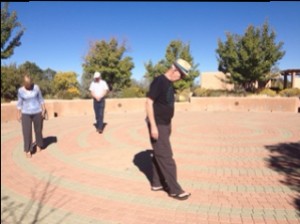(Continued from the last two posts) So for the person of faith, after the damage comes forgiveness! For Christians it is part of , if not the central message: God in Christ has forgiven all we have done–past, present, future, and we are to do the same. It is called Grace! But how do I, a damaged human being live that, feel it, let it be the power in me that heals?
For victims of collateral damage from clergy misconduct, not the principal victims of damage or the perpetrators, the call to forgive is not always crystal clear. If I am a victim, how is it that I have been hurt? Who has wounded me? Are my feelings of hurt always good indicators of the wrong doing of another? Or are my feelings hurt because I have projected on to a leader or colleague some unrealistic expectations? What is mine to forgive? And if it is a community of people who feels the pain, what are they asked to forgive?
In walking though the valleys of the shadow of ruptured relationship in the Body, I have seen two impulsive and opposite reactions: one is to want to sever the relationship, cut off the connection altogether immediately. Often that becomes a hardened position which says, “I can never forgive this betrayal.” The other is a rush to “forgiveness,” which says “let bygones be bygones, people are people, and aren’t we all about forgiveness anyway?” without taking time to consider what forgiveness looks like for this particular situation, who needs to forgive whom, and how that forgiveness takes shape in our shared life.I am helped in my musings by a reflection by Dawn Eden in her new book My Peace I Give You: Healing Wounds with the Help of the Saints, Ave Maria Press, when she lists what forgiveness is and what is isn’t:
- Forgiveness is not the same as reconciliation.
- Forgiveness means letting go of resentment.
- Forgiveness does not mean forgoing the demands of justice.
- Forgiveness means praying for the offender.
- Forgiveness is not without pain. pp. 92-3
So as one who regularly repeats from the heart what we call “The Lord Prayer” together with the faith community, what do I mean when I pray “Forgive us our sins, as we forgive those who sin against us”?
For me the core question, the one that allows the stream of healing to begin to flow, is whether or not I am willing to forgive when I discover what exactly that means, as one who has been damaged unintentionally on the periphery of the principal action. I read long ago from another saint that if we don’t feel able to forgive, we can begin with the prayer, “Make me willing to forgive.” I am struck with how tempting and initially satisfying it seems to be to hang on to the hurts and slights, to rehearse the damages, to sit in the seat of the scornful toward those who have have fallen. Yet I hear and see Jesus model and offer forgiveness again and again, in the most egregious acts of wounding, literally. So I want to be able to pray and then act as if I am willing to have my heart changed, and trust that the Spirit will be at working me doing just that.
Then I need to look at my words and actions from my broken heart with deep scrutiny: have a betrayed a confidence? have I shared a story under the rubric of “prayer concern” that is just in fact gossip and possibly slander? Alternately, have I kept quiet when I need to step up to speak the truth? Have I colluded in the conspiracy of silence that allowed the collateral damage to spread? If so, I need to own that and see what behavioral changes I need to make.
I have come to see that in God’s good time wounds can be healed, and persons can be restored, but life in the Body cannot be put back together again the way it was. So what is the new thing is God doing after the damage? What is God teaching me? What is God teaching those who inflicted the wounds? What is God teaching the community about new ways to trust? to learn? to listen? to speak out? to hold accountable? And what is my part is contributing to that healing?
I grieve that faith communities get wounded by their leaders, and I grieve that the brokenness of leaders brings hurt and confusion to the Body. But I trust in Spirit of the Risen Christ for whom there are no final defeats who can create something new in people and communities if there are eyes to see, ears to hear and hearts that are open.











